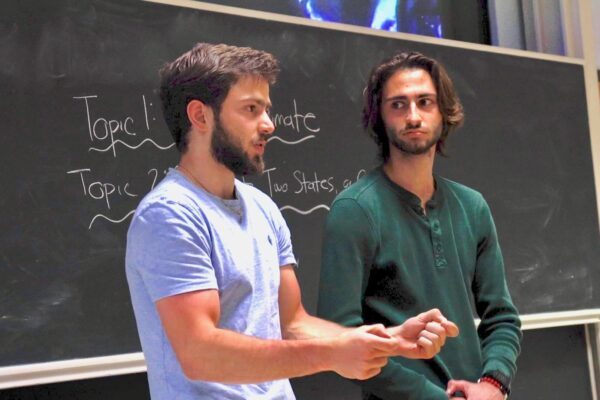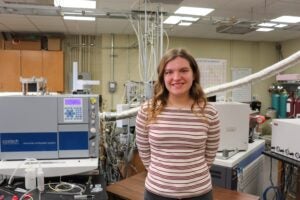Elijah Kahlenberg, a junior triple-majoring in government, Middle Eastern studies and Jewish studies, is The University of Texas at Austin’s latest Truman scholar.
The federally funded Truman Scholarship provides $30,000 to students pursuing graduate studies in public service fields. The U.S. Congress created the scholarship in 1975 as the official memorial to President Harry S. Truman.
Kahlenberg had an inkling he had won when the head of postgraduate scholarships at UT called and asked him to show up at the Tower in two hours in a suit. “I thought, either I’m being expelled or I’m getting Truman,” he joked. It was the final step in a rigorous process of essay writing, recommendations and interviews. President Jay Hartzell presented him with the award in his office. “I was on the verge of tears,” Kahlenberg said. “It was a surreal experience. I’m still in shock. It seems like a dream.”

Each year, 50 to 60 college juniors are named Truman scholars. The scholarships traditionally have been awarded to one student from each U.S. state. U.S. universities may nominate four students annually.
The prestige is worth much more than the money, but Kahlenberg said he plans to use both to pursue a joint J.D. and Ph.D. at Columbia University. The J.D. will focus on international law, and the Ph.D. will focus on Middle East studies and government. Columbia has the advantage of being in New York, the hub of most international legal institutions, but he told Hartzell during their meeting he would love to teach at UT one day.
A graduate of San Antonio’s Ronald Reagan High School and a die-hard Spurs fan, referring to Spurs phenom Victor Wembanyama, he said, “with Wemby and the Truman Scholarship, I’m the luckiest person in the world!” He is the youngest of three sons, all of whom are Longhorns, with older brothers Zach and Sam Kahlenberg both Texas Exes and medical doctors.
Kahlenberg has been studying the Israeli-Palestinian issue since he was 12. At UT, he is the president and founder of Atidna International, an organization dedicated to bringing together Jews and Arabs to have civil dialogue on “anything and everything” pertaining to Israelis and Palestinians. “It’s my personal belief that Jews and Arabs are cousins. When you look at our culture, our identity, our aspirations, not only do they not conflict, they’re more similar to each other than any other people,” he said.
“It’s not only a fact in and of itself, but viewing yourself as part of one family is a great way to break down a lot of animosity and hatred. We do peace events around that theme,” he said.

Last semester, they held a joint vigil on Nov. 7, the one-month mark of the start of the war between Israel and Hamas, to honor all innocents, Israelis and Palestinians, who had been lost in the war. “An event like that is a way to get Jews and Arabs in a common space. When you can mourn with each other, that’s when you can solidify that we’re one family.” They also hold dialogue sessions.
“You work really hard, and you may do all the right things and this may never happen. This is great for everyone. Great for students. It’s great for the University. It’s great for the world,” Hartzell said to Kahlenberg of the selectivity of the Truman Scholarship Foundation and Kahlenberg’s founding of Atidna. “It’s a time when that work is needed. When we say what starts here changes the world, we take it seriously.”
He said his career aspiration is to become a professor of international law, and if he had a magic wand, the culmination of his career would be to win the Nobel Peace Prize while working for the U.S. government or an independent organization to bridge the gap between the two peoples.
He is also on the board of an organization called Roots, which he said is the only group in the West Bank to bring together Jews and Arabs in a civil and joint space for mutual understanding and reconciliation. “There might be some inherent tension when we first enter the space, but through organizations like Atidna and Roots, we have a chance to have conversations that reveal that our culture and aspirations and identity are honestly one and the same.”
As evidence, he cites a typical Palestinian garment called a keffiyeh and the Jewish prayer shawl called a tallit. “When you look at the origin of both of those dresses, you find they came from the same exact source, a Canaanite dress from around 4,000 years ago. When we dive into our culture, our ancestry, our roots, it’s one and the same.”
Kahlenberg is the 26th UT student to be named a Truman scholar since the award was established 49 years ago. UT’s first recipient, Carmen Marie Serna, who won the scholarship in 1979, also was a government major.




